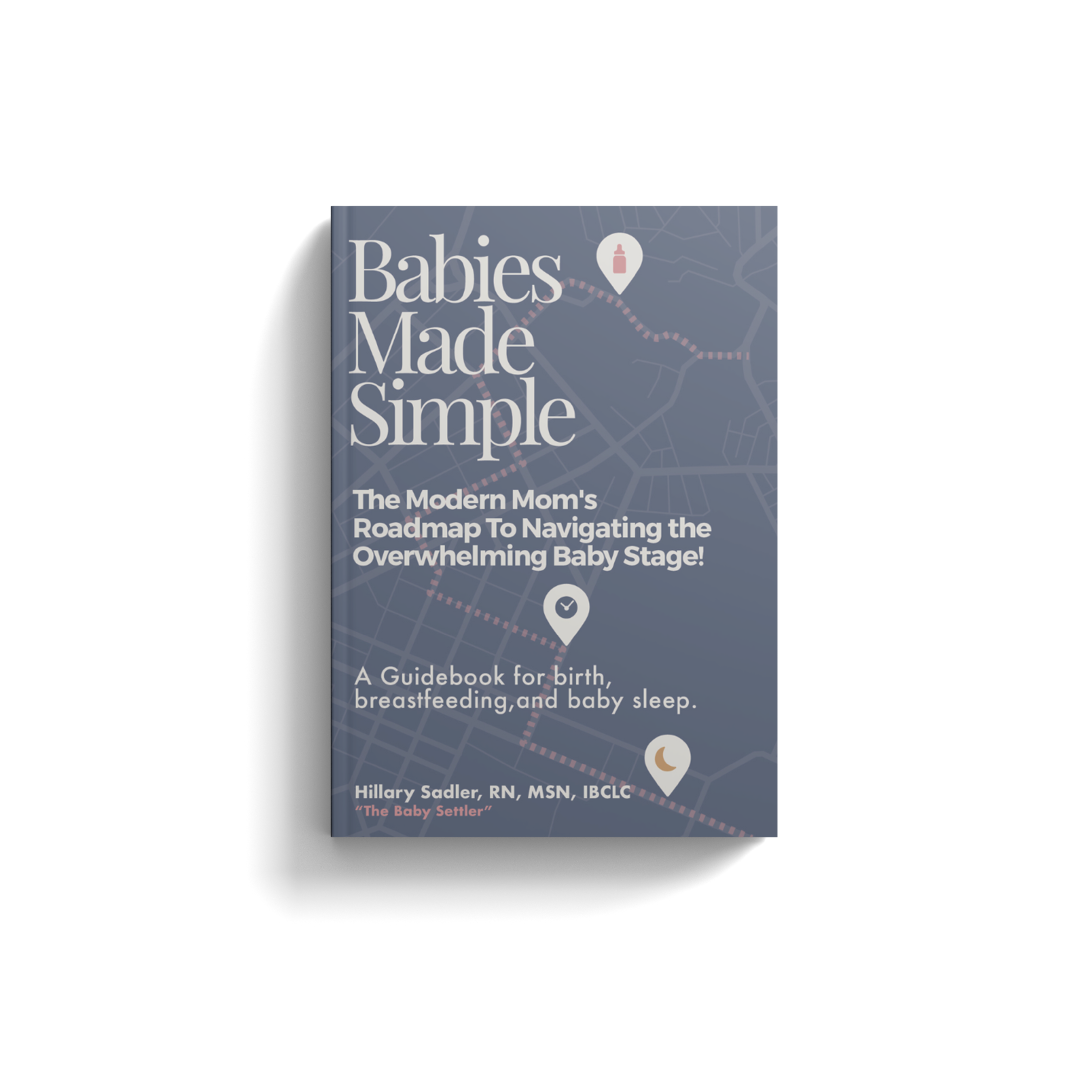
When feeding makes sense, sleep finally does too.
Books, on-demand courses, and one-on-one consults that simplify early motherhood by starting where it all begins: feeding.
When feeding makes sense, sleep finally does too.
Books, on-demand courses, and one-on-one consults that simplify early motherhood by starting where it all begins: feeding.
Choose Your Path

Get the Book
Babies Made Simple
A Guidebook for Birth, Breastfeeding, and Baby Sleep.
Learn how feeding, sleep, and routines actually work together—so you can stop guessing and start enjoying your baby.








Baby Sleep Course
Babies Made Simple On-Demand Course
The Babies Made Simple on-demand course shows you how feeding unlocks sleep. Learn the foundations most programs skip—so you can confidently design a rhythm that fits your baby, not someone else’s schedule.
-
An Online Class + Cliff Notes PDF Guide for 0–12 months.
-
Most sleep programs skip the first step.
-
30-day money-back guarantee

Personalized 1:1 Consult
We help make the baby stage more simple.
Real babies. Real science. Real results.
Our Registered Nurse + IBCLC team has helped over 5,000 families build healthy feeding + sleep foundations. Often covered by commercial insurance!
In-Home Charleston, SC Area | In-Office Mt.Pleasant | Virtual Anywhere
Questions? Call or text us at (843) 396-5261

Top Parenting Podcast
The Early Momming Podcast
Honest conversations, expert insights, and encouragement for early motherhood. Listen wherever you get your podcasts.
“I’d recommend this podcast to any new mama’s especially on those long, tough days when you just need someone in your corner” – Avaahall

Weight loss + wellness, built for moms.
Feel like yourself again
Root-cause approach to postpartum weight loss and whole-body recovery.
We support moms in healing from pregnancy, birth, breastfeeding, and the postpartum season using personalized care that may include GLP-1 medications alongside nutrition, hormone support, metabolic health, and lifestyle optimization—so you can feel like yourself again, inside and out.
Want more info about this? Call or text us (843) 396-5261
Offered in-person in Charleston, SC or virtual Nationwide
Still scrolling? Maybe you’re wondering…
When can I start helping my baby sleep through the night?
Every baby is different, but most are capable of sleeping longer stretches between 4 and 6 weeks—once they’re meeting their full feeding needs during the day. The key is getting daytime feeding right so nighttime sleep can follow naturally.
How is Baby Settler different from other baby sleep programs?
Most baby sleep programs focus only on sleep. At Baby Settler, we teach the connection between feeding and sleep—because when feeding makes sense, sleep finally does too. Our approach is rooted in clinical experience, not rigid rules.
Do I have to let my baby cry it out?
No. Our method is gentle and developmentally appropriate. We focus on helping your baby feel full, secure, and well-rested—without unnecessary tears or stress.
Can your method work for both breastfeeding and bottle-feeding?
Yes! We support all feeding styles—breast, bottle, pumping, formula, or a combo of all the above. What matters most is understanding your baby’s cues and volume needs, not how they’re fed.
Do you offer both in-person and virtual support?
Yes. Our team of nurses and IBCLCs works with families in person around Charleston, SC, and virtually across the U.S. Many consults are covered 100% by insurance.
What’s the first step to getting started?
You can start wherever you are.
- If you love to read, grab Babies Made Simple on Amazon.
- If you prefer to watch, our on-demand baby sleep course walks you through every step.
- And if you want personalized help, book a 1:1 consult with our expert team.

Meet the Founder
Helping you love the season you’re in.
Because when feeding makes sense, sleep finally does too.
Hillary Sadler, RN, MSN, IBCLC, has supported thousands of families through the newborn stage and beyond. She blends medical expertise with real-life experience to help parents find confidence, rest, and connection in early motherhood.
The Baby Setter Difference
Why our method works when other cookie-cutter programs don’t.
We focus on the foundation
Most programs start with naps and routines. We start with feeding—because when babies feed efficiently during the day, they sleep better at night.
Flexible, not rigid schedules
Real life doesn’t always run like clockwork. Our approach adapts to your family while still supporting predictable, restorative sleep.
Real‑life expertise
We’re not just creating courses—we’re seeing patients every week. With a thriving private practice in Charleston, SC, we’ve worked with over 5,000 families in person.
What fellow parents are saying…
Never miss a resource—join our email list!
Join The Early-Momming Insider—my personal bi-weekly email where I share mom-life truths, sleep tips that actually work, and the products saving my sanity.
Learn the Why Behind the What
Explore our blog for practical, evidence-informed guidance on feeding, sleep, and thriving through early motherhood.
Postpartum Weight Loss in Charleston, SC: Why Your Body Feels Stuck After Baby
Postpartum Weight Loss in Charleston, SC: Why Your Body Feels Stuck After Baby If you’re a postpartum woman in Charleston doing everything “right” — eating well, moving your body, prioritizing protein, cutting back on sugar — and the weight still won’t budge, I want to start by saying this: You…
Free Download: Feeding, Wake Time & Sleep Goals by Age (0–12 Months)
Feeding, Wake Time & Sleep Goals by Age (0–12 Months) If you’re a new parent, there’s a good chance you’ve Googled some version of: How often should my baby eat? What are normal wake windows by age? Why is my baby waking so much at night? Am I doing something…
How to Drop Nighttime Feeds the Baby Settler Way | Baby Settler
How to Drop Nighttime Feeds the Baby Settler Way If you’ve ever whispered, “Will I ever sleep again?” at 3 a.m., you’re not alone. Nighttime feeds are completely normal in the beginning—but they don’t have to last forever. With the right foundation, your baby can sleep longer stretches naturally, without…
How to Protect Your Milk Supply as Baby Sleeps Longer | Baby Settler
The Ultimate Guide to Protecting Your Milk Supply as Your Baby Sleeps Longer Stretches When your baby finally starts sleeping through the night, it can feel like a dream come true. But for breastfeeding moms, that longer stretch of sleep often brings new worries: Will my milk supply drop if…
Newborn Vaccine Schedule: Informed Decisions for New Moms | Baby Settler
The Newborn Vaccine Schedule: A Practical Guide for Informed Parents (Early-Momming Podcast Recap) TL;DR (For Type-A Moms on a Timer) This episode of the Early-Momming Podcast explores how to think through the newborn and early-infancy vaccine schedule—not to tell you what to do, but to help you ask better questions.…
Returning to Work as a New Mom
Returning to Work as a New Mom: The Ultimate Guide to Pumping at Work Going back to work as a new mom can be tough. You are handling your job and taking care of your baby. Now, you need to find a way to keep breastfeeding or pumping while doing everything else. Don’t worry, many moms feel the same way. With some planning, you can continue breastfeeding or pumping successfully. If you\'re looking for more in-depth advice, be sure to check out our latest podcast episode. We dive deeper into real-world tips and strategies for new moms. In this blog, we’ll go over everything you need to know about pumping at work. This includes picking the right equipment to keeping your milk supply up. 1. Why Pumping at Work Is Important Breastfeeding is a special time for both you and your baby. But when you return to work, it doesn’t have to be the end of your breastfeeding journey. Pumping allows you to express breast milk while you\'re away from your baby. This ensures that you can continue to nourish your little one with breast milk even when you’re at the office. Pumping at work might seem like a lot, but with a good plan and the right gear, it can be easier than you think. By setting yourself up for success ahead of time, you can keep breastfeeding or pumping, and still do your job effectively. 2. Use a Hands-Free Pump (But Not Right Away) One of the most helpful tools for breastfeeding moms today is the hands-free pump. Models like Willow Go and Momcozy let you pump while you do other things—perfect for busy moms who need to multitask at work. However, you should wait until your milk supply is fully established before using a hands free pumping regularly. We recommend waiting until after the first month postpartum. This is because wearable pumps might not remove milk as effectively as traditional…






